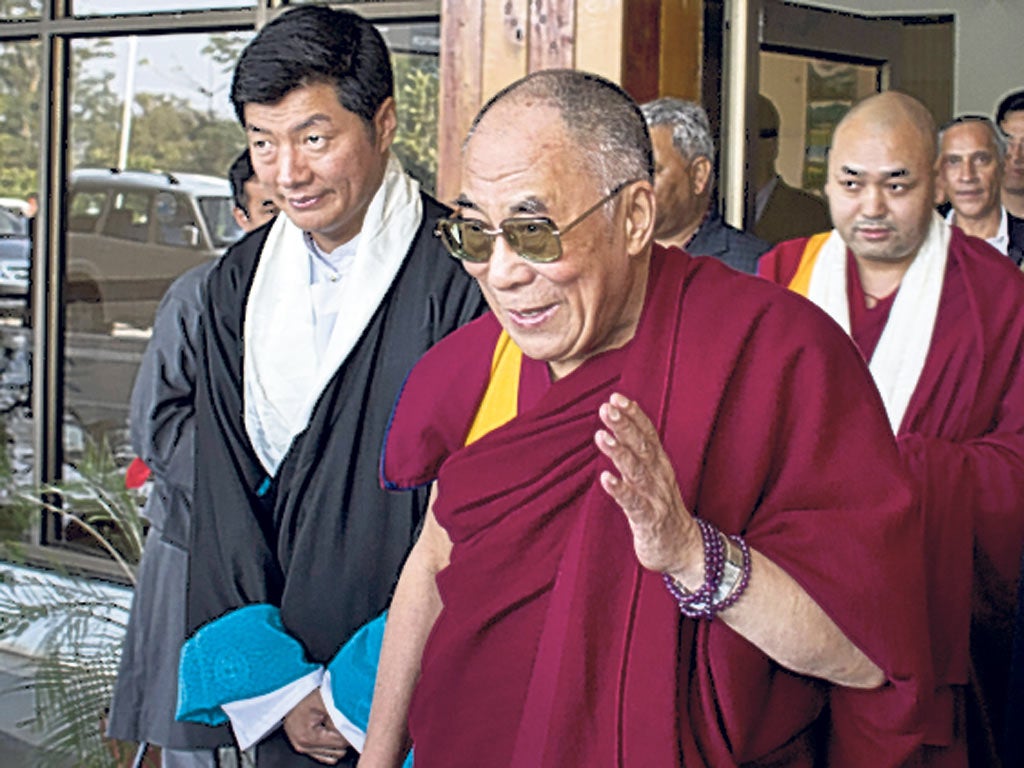Tibetan leader calls on West to speak out on repression

Your support helps us to tell the story
From reproductive rights to climate change to Big Tech, The Independent is on the ground when the story is developing. Whether it's investigating the financials of Elon Musk's pro-Trump PAC or producing our latest documentary, 'The A Word', which shines a light on the American women fighting for reproductive rights, we know how important it is to parse out the facts from the messaging.
At such a critical moment in US history, we need reporters on the ground. Your donation allows us to keep sending journalists to speak to both sides of the story.
The Independent is trusted by Americans across the entire political spectrum. And unlike many other quality news outlets, we choose not to lock Americans out of our reporting and analysis with paywalls. We believe quality journalism should be available to everyone, paid for by those who can afford it.
Your support makes all the difference.Even under the best circumstances, stepping into a role previously occupied by someone considered to be a living god would have required a steep learning curve. But less than 100 days after Lobsang Sangay was elected "prime minister" of the Tibetan government in exile, the self-immolation of at least 11 Tibetans has confronted him with a remarkable challenge.
"It's an unprecedented trend, one after the other. You get these calls, early in the morning or late at night... one more Tibetan has self-immolated," he said in an interview in his office in Dharamsala, home to the Tibetan community in India since the Dalai Lama fled Tibet in 1959. "You don't really know anything. You don't have any images, or just two or three. And when you do see them, they are so horrifying. How can a human being be driven to such a desperate situation that they think it is better to give up their life?"
After his election, the Indian-born, US-educated Mr Sangay was obliged to give up his existence as a Harvard academic and move, physically and mentally, to the refugee community of Dharamsala to take up the struggle for "meaningful autonomy for Tibet". His wife and child will join him, he says, once he has finished insulating his house and put in a new floor.
Mr Sangay said although he did not have full details, he did not believe the immolations were being organised. Rather, he said, individuals were reacting to the repression and authoritarianism of the Chinese authorities. He said Beijing had sought to blame people like him for what had happened.
The 43-year-old was elected on a platform of the so-called "middle way" previously pursued by the Dalai Lama, who focused on trying to secure religious and cultural rights for the 5.5 million Tibetans inside Tibet, rather than independence from China. The movement has largely bowed to the Dalai Lama's wishes, and Mr Sangay said he did not think the immolations were a rejection of a moderate approach. However, some younger Tibetans would prefer something more direct and urgent. "I understand the frustration because there has been no breakthrough," said Mr Sangay, himself a former office holder in the Tibetan Youth Congress.
The decision by the Dalai Lama to split his religious and political role, something that had never happened before, means Mr Sangay has an official role in the eyes of foreign governments and officials. Lobbying from China means few foreign leaders are likely to meet him as he will not be recognised as a religious leader, as the Dalai Lama is. Last month, when South Africa failed to grant a visa to the Dalai Lama to enable him to attend the 80th birthday celebrations of Bishop Desmond Tutu, many blamed pressure from Beijing.
But Mr Sangay recently made a successful visit to US where he testified before a House of Representatives human rights commission, telling lawmakers: "I think it's high time the international community realises the gravity and the urgency of the situation."
Later this month he will visit Britain and Europe. He has intentionally not asked for a meeting with David Cameron or William Hague, aware of the controversy such a request would create, but he said he believed the British government could be more vocal about human rights in Tibet and called on it to speak out over the immolations. "A lot could be done," he said. "Every statement counts, every statement indicates that these lives are not lost in vain."
Join our commenting forum
Join thought-provoking conversations, follow other Independent readers and see their replies
Comments